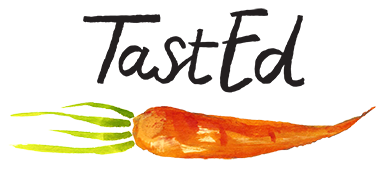TastEd is the official UK wing of the Sapere network of sensory food education, also known as ‘taste education’. The evidence base for TastEd as an effective model for increasing children’s willingness to try new foods (especially fruits &vegetables) currently takes several forms. One thing we should say is that children’s food habits are famously hard to measure, given that no human learns to eat in a laboratory. It is exceptionally tricky to disentangle the influences on a child’s eating from school and from home. When we ask ‘is TastEd effective’? generally the measure we would look at is ‘does it increase a child’s willingness to try new foods?’ But other questions also matter e.g. did the child enjoy the experience?
The first form of evidence for the TastEd method is the body of published research into the effectiveness of Sapere among children in other countries. You can read some of the research here. More recent research into the Sapere method in Finland, published in 2018, found that – based on survey data – exposure to sensory food education was associated with pre-school children being more willing to try new vegetables & fruits compared to a control group. Another form of evidence which we drew on when creating our resources was sharing best pedagogical practise from Sapere teachers around the world. In 2019, we hosted the annual Sapere Symposium and learned from sensory food educators from Japan, Sweden, Finland, France and Norway.
Beyond Sapere, there are a number of studies suggesting that multisensory exposure to foods can increase the acceptance of unfamiliar vegetables with young children. See, for example, Dazeley et al 2012, Coulthard et al 2017. Outside of the classroom, there is a vast body of evidence suggesting that children’s taste preferences are largely a function of repeated, direct exposure to foods. We have developed our learning resources with the help of an advisory panel – including Lucy Cooke, one of the leading researchers into how children learn to enjoy vegetables.
As well as drawing on formal academic research, we are also working closely with teachers from schools and nurseries across the U.K. to collect both quantitative and qualitative feedback in a more informal way to establish the immediate impact of TastEd. Every TastEd lesson plan ends with a simple question: did anyone try anything new today? So far, to our knowledge, this question has never yet elicited a ‘no’ response from all of the children. Usually, the vast majority of children in a class of thirty will put their hands up.
Last academic year (2020-2021) teachers reported that 71% of primary school pupils who took part in TastEd lessons tried a new fruit or vegetable. This is based on 37 sessions run across 10 schools. Meanwhile, 74% of children liked a fruit or vegetable that they tried during a TastEd lesson. During the 2021-2022 academic year we asked teachers and EYFS practitioners “Did pupils’ confidence in trying new foods increase as a result of running TastEd lessons?” Responses from 50 schools and nurseries were: 86% of teachers reported an increase in confidence, 8% saw no increase and 6% were unsure.
In the short time since TastEd was founded, we have gathered a mass of anecdotal feedback from teachers that the method works for most children in terms of empowering them to try (and often like) new vegetables and fruits. Some of this is on our website whilst you can see more on social media. Or here are a few examples from teachers from three different primary schools:
“There are two autistic children in Y1, one of whom has a full-time TA. He’s never touched or eaten veg in his life…[his parents have] been so impressed to hear that he took part in peeling the clementines…and prodding the salad veg”
“The whole Year 2 class tried four kinds of cabbage even though the teachers were convinced they wouldn’t”. “Ten children had never tasted raw peppers before and seven of those said they would eat them in the future”
“They could not stop talking about [TastEd] during the week and they are still talking about it now. I have noticed that the children will now explore more food at lunchtime”.
Finally, we are currently working with two separate teams of researchers – one at the University of Exeter and one at the University of Roehampton – to help establish a UK-based evidence base exploring the benefits of sensory food education for children’s eating habits and taste preferences. We continue to be informed by new evidence and look forward to the results of new research that is being undertaken.
